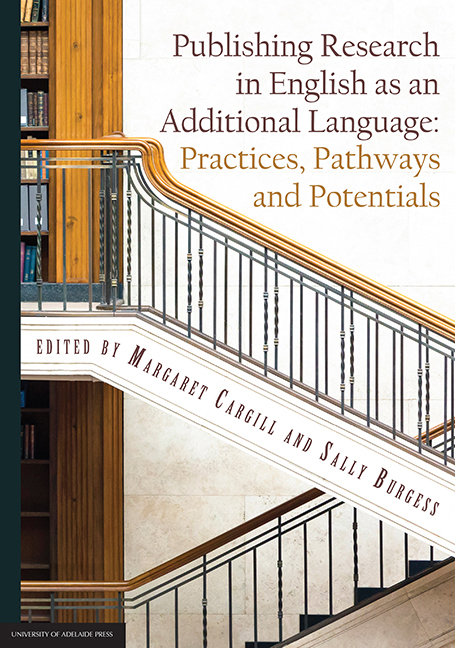Book contents
- Frontmatter
- Contents
- List of contributors
- Acknowledgements
- Foreword
- Introduction: Unpacking English for Research Publication Purposes [ERPP] and the intersecting roles of those who research, teach and edit it
- 1 Accept or contest: A life-history study of humanities scholars’ responses to research publication policies in Spain
- 2 Introducing research rigour in the social sciences: Transcultural strategies for teaching ERPP writing, research design, and resistance to epistemic erasure
- 3 Blurring the boundaries: Academic advising, authors’ editing and translation in a graduate degree program
- 4 The delicate art of commenting: Exploring different approaches to editing and their implications for the author-editor relationship
- 5 The CCC Model (Correspondence, Consistency, Correctness): How effective is it in enabling and assessing change in text-editing knowledge and skills in a blended-learning postgraduate course?
- 6 How credible are open access emerging journals? A situational analysis in the humanities
- 7 Disseminating research internationally: Intra-subdisciplinary rhetorical structure variation in immunity and allergy research articles
- 8 Scientists publishing research in English from Indonesia: Analysing outcomes of a training intervention to inform institutional action
- 9 ‘The one who is out of the ordinary shall win’: Research supervision towards publication in a Chinese hospital
- 10 The geopolitics of academic plagiarism
- 11 Training ‘clerks of the [global] empire’ for 21st-century Asia? English for Research Purposes (ERP) in Vietnam
- 12 Standardisation and its discontents
- Reflections and future directions in publishing research in English as an Additional Language: An afterword
8 - Scientists publishing research in English from Indonesia: Analysing outcomes of a training intervention to inform institutional action
Published online by Cambridge University Press: 16 March 2018
- Frontmatter
- Contents
- List of contributors
- Acknowledgements
- Foreword
- Introduction: Unpacking English for Research Publication Purposes [ERPP] and the intersecting roles of those who research, teach and edit it
- 1 Accept or contest: A life-history study of humanities scholars’ responses to research publication policies in Spain
- 2 Introducing research rigour in the social sciences: Transcultural strategies for teaching ERPP writing, research design, and resistance to epistemic erasure
- 3 Blurring the boundaries: Academic advising, authors’ editing and translation in a graduate degree program
- 4 The delicate art of commenting: Exploring different approaches to editing and their implications for the author-editor relationship
- 5 The CCC Model (Correspondence, Consistency, Correctness): How effective is it in enabling and assessing change in text-editing knowledge and skills in a blended-learning postgraduate course?
- 6 How credible are open access emerging journals? A situational analysis in the humanities
- 7 Disseminating research internationally: Intra-subdisciplinary rhetorical structure variation in immunity and allergy research articles
- 8 Scientists publishing research in English from Indonesia: Analysing outcomes of a training intervention to inform institutional action
- 9 ‘The one who is out of the ordinary shall win’: Research supervision towards publication in a Chinese hospital
- 10 The geopolitics of academic plagiarism
- 11 Training ‘clerks of the [global] empire’ for 21st-century Asia? English for Research Purposes (ERP) in Vietnam
- 12 Standardisation and its discontents
- Reflections and future directions in publishing research in English as an Additional Language: An afterword
Summary
Introduction
Indonesian universities are now facing a mandatory requirement for candidates to publish a paper in English in an international journal before a PhD degree can be awarded (Directorate Generale of Higher Education-Indonesian Ministry of Education [DGHE], 2012). The introduction of this requirement follows a similar action in China, where the bar is set higher at a journal indexed in the Science Citation Index or equivalent for candidates in the sciences (Li, 2006). This new requirement adds considerably to the already strong pressure experienced by Indonesian academic supervisors/advisors to achieve international publications and citations themselves (Sanjaya, Sitawati & Suciani, 2015), especially in the natural and life sciences (Hanauer & Englander, 2013). A factor that can be expected to contribute to the pressure is the limited nature of instruction in English for Academic Purposes [EAP] for both undergraduate and graduate students (Sadtono, 2001), especially as regards academic writing. There is thus a need to investigate how Indonesian academics are adapting to this additional pressure, as well as to test new educational initiatives for strengthening the skills of both mentors and authors in Indonesia when writing for publication in English. Such an initiative is the CIPSE [Collaborative Interdisciplinary Publication Skills Education] training approach. Developed by Cargill and O'connor for use with early-career science researchers and implemented successfully in a range of Chinese contexts (Cargill, 2011; Cargill & O'Connor, 2012), this approach features the integration of perspectives from science, applied linguistics and education. However, a range of context-specific differences may affect its suitability for use in the Indonesian higher education setting. Overall, little research has been published to date investigating the challenges faced by Indonesian supervisors and their graduate students in this new context, or moves to help address the challenges. Here we contribute to addressing this lack by reporting on an invited intervention (a five-day CIPSE workshop) delivered to a cohort of staff from one faculty of a highly ranked Indonesian university in 2014, and a follow-up study with participants 12 months later.
A strength of the project design was that it built on an existing network based on scientific and educational collaborations over 20 years, which was expected to help overcome the potential pitfall of ‘one-shot’ professional development programs (Cannon & Hore, 1997).
- Type
- Chapter
- Information
- Publishing Research in English as an Additional LanguagePractices, Pathways and Potentials, pp. 169 - 186Publisher: The University of Adelaide PressPrint publication year: 2017

